| | AUTUMN WITH THE 2OTH-CENTURY CZECHOSLOVAKIAN CLASSICAL MOVIES |
|
During October through November, the Tolerance Centre of the Vilna Gaon State Jewish Museum invited visitors to spend five evenings with the 20th-century Czechoslovakian classical movies.
In collaboration with the Embassy of the Czech Republic in Vilnius, a series of five feature films about the life of Jews in Czechoslovakia in the pre-war years and during the Second World War was shown. As in every pre-war state, in Czechoslovakia and particularly in Prague, the Jewish communities were an important part of society that influenced the country’s cultural and public life. The films in the series depict the stories of that dramatic period intertwining real historical events, the lives of the Jews, Czechs and Slovaks and their love stories with elements of fantasy and terror. |
|
The first event of the cycle “The Autumn with the 20th-Century Czechoslovakian Classical Movies” took place on 25 October when the feature film “Long Journey” directed by Alfréd Radok in 1949 was shown at the Tolerance Centre. Banned for forty years of the occupation, this film remained in the memory of the Czechs as one of the masterpieces in the country’s cinematography. The director Radok (1917–1976) had Jewish roots and many members of his family died in the Nazi concentration camps. The film shot in the complicated post-war circumstances reflects the personal sufferings of the director himself. The “Long Journey” gives the meaning to love as the only support in efforts to survive in the inhuman war conditions. |
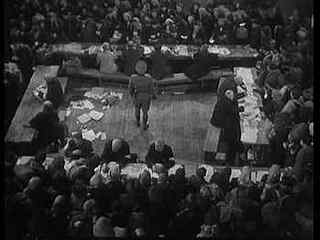 |
|
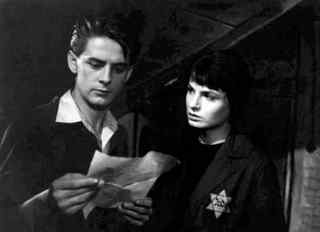
|
On 2 November, the 1959 feature film “Romeo, Juliet and Darkness”, directed by Jiří Weiss, was shown. The action of the film is developing in Prague occupied by the Nazis. A man hides a Jewish girl who separated from her family tries to escape her destiny. However, their love was not fated to blossom. The film director Weiss (1913–2004), who was of German and Jewish origins, was born in Prague. He dedicated more than one film to the topic of the Nazi occupational regime. He was forced to leave the native land twice: the first time when the Nazis came and the second time in 1968 when the Soviets occupied Prague. |
|
On 8 November, the feature film “The Shop on Main Street”, directed by Ján Kadár and Elmar Klos in 1965. It won the Oscar in 1966 as the best film in foreign language. The film takes us back to Slovakia of the Second World War. The Nazis offer a modestly living Slovak, Tono. to take over a tiny shop from the Jewish widow trading in sewing paraphernalia. The widow is already old, detached from the world and thinks that Tono looks for a job. She agrees to take him. Tono and the old woman get to like each other. However, unexpectedly the Nazis announce that all Jews are to leave the city. What does Tono have to do with the old woman? |
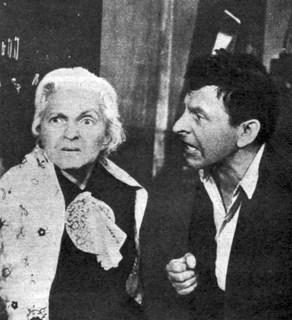 |
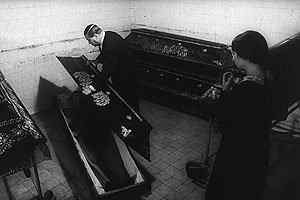 |
On 15 November, the feature film “The Cremator”, directed by Juraj Herz in 1968. In the film the Slovak film director Herz (born 1934) tells a horrible story of how the anti-Jewish Nazis propaganda affects the moral attitudes of a family father with an unstable psyche (each day he works in the crematorium). Believing the myth of the Aryan race, he starts cleaning the world from the non-Aryans. His mother-in-law is Jewish; his wife is half-Jewish, even in his children‘s veins Jewish blood is running. |
|
On 22 November, the film “Forbidden Dreams” directed by Juraj Herz in 1986 was shown. The Czech film producer Karel Kachyňa (1924–2004) creates an odd story that takes place during the Second World War. The black comedy pervaded by painful problems of the Holocaust is developing as a sad fairy tale joining elements of subtle grotesque. The main hero of the film, the head of a Jewish family, is possessed by three passions: fishing, pretty women and desire to provide for his family as best as possible. His two elder sons learn that they must move to the Terezin concentration camp. The father knows that the same fate is awaiting him as well. However, until that time he must feed his family, as well as hunt the deer of his dreams. |
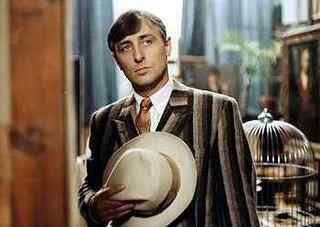 |
|
Every evening, the Czech Ambassador Radech Pech introduced the films to the viewers underlining the contents of the films and their importance in the political context of the then Czechoslovakia. | | | Modified: 1/14/2011 |
|
| | | | | Information | | 2017.03.01 | |
|
If you want to order a guided tour or educational programme please contact us in advance:
tel. +370 60163612,
email: muziejus@jmuseum.lt
***
If you want to order an educational programme, please contact us at: +370 5 212 0112,
+370 6 8986 191 or via email muziejus@jmuseum.lt
***
Tolerance Center
(Naugarduko St. 10/2)
working hours:
Monday,Thursday: 10:00-18:00
Tuesday, Wednesday: 10:00-18:00
Friday: 10:00-16:00
Saturday-closed,
Sunday: 10:00-16:00
***
Holocaust Exposition
(Pamėnkalnio St. 12)
working hours:
Monday-Thursday: 9:00-17:00
Friday: 9:00-16:00
Saturday-closed
Sunday: 10:00-16:00
***
Memorial Museum of Paneriai
(Agrastų St. 15, Aukštieji Paneriai)
working hours:
Monday-closed
Tuesday–Sunday 9:00-17:00
From October until May the Memorial Museum is open by appointment only.
If you are interested in visiting the museum/the memorial with a tour guide, please contact us at least a day in advance at
+370 699 90 384 or via email mantas.siksnianas@jmuseum.lt
***
|
|
| | | | | | |  | |  |
|


